|
Taragirite (also known as
Origin Stone) is a primary element which all other naturally-formed minerals on
planet Oci
are derived from. Its name is derived from that of Oci's
creator.
Exposed to certain environments, Taragirite becomes charged with elemental energies.
Study of these derivative minerals is known as Targology.
Natural
Derivatives
|
|
|
Biocite (Shiny Stone)
Created when Taragirite has prolonged exposure to
Aura. Biocite receives its power from the
Aura Network
and returns it as nourishing energy for plantlife.
Biocite typically lies a good distance under
the planet's crust, making it difficult to excavate by the average person.
However, in some areas it lies closer to the surface in rocky protrusions. The
Biocite's energies cause moss to grow atop these rocks - this moss has been
known to cause mutagenic effects.
Additionally, fresh water that has been exposed to Biocite gains
remarkable healing properties.
|
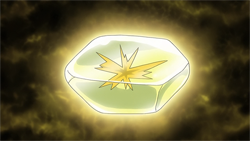 |
|
Pyrocite (Fire Stone)
Created when Taragirite becomes superheated by flames or exposure
to lava. Pyrocite has a distinctive flame-like pattern under its surface. It
generates a limited amount of its own heat and can be used for making explosives.
Entei's head crest is said to be constructed from pure Pyrocite. Variants of Pyrocite are able to evolve certain species of Pokémon.
|
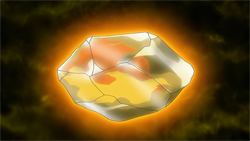 |
|
Hydrocite (Water Stone)
Created when Taragirite is consistently doused by water imbued
with certain nutrients. Hydrocite bears light blotches that appear like bubbles
on its surface. Hydrocite can be used to purify a small amount of water to make it fit to drink.
Suicune's head crest is said to be constructed from pure Hydrocite. Variants of Hydrocite are able to evolve certain species of Pokémon.
|
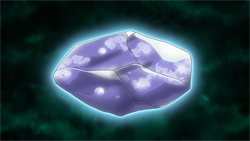 |
|
Raidenium (Thunder Stone)
Created when Taragirite becomes supercharged by electricity
generated by thunderstorms. Raidenium has a pattern resembling a thunderbolt
under its surface. It can be used as a component for a lightning rod or an electrical battery, but the latter cannot be recharged with conventional methods.
Raikou's head crest is said to be constructed from pure Raidenium. Variants of Raidenium are able to evolve certain species of Pokémon.
|
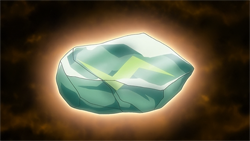 |
|
Distonite (Dusk Stone)
Created when Taragirite is exposed to
Distortia.
It is difficult to obtain, being only found in areas where interdimensional
rifts have occurred. The properties of Taragirite stabilise the Distortia
absorbed, which makes Distonite relatively safe to handle. Distonite is able to evolve certain species of Pokémon. |
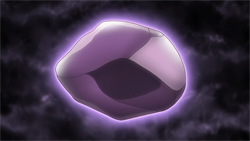 |
|
Rimium
(Ice Stone)
Created when Hydrocite is exposed to extremely low temperatures. Rimium is quite prevalent in
Phrossa and the upper slopes of Snowpoint Mountain Range,
Sinnoh.
Like certain variants of Hydrocite, Rimium is able to evolve particular species
of Pokémon. |
|
|
Pentacite
(Echo Stone)
It is currently unknown how Pentacite is
formed.
Pentacite has the ability to amplify and transmit mindspeech. In ancient times, some civilisations used a combination of Pentacite and
Cho'moken to form simple communication networks. |
|
|
Chronocite
(Time Stone)
It is currently unknown how Chronocite is
formed.
Chronocite has the ability to manipulate the time stream
and has only been found within the organic structures of a few Pokémon species.
At one point,
Xatu were almost driven to extinction as a result of Chronocite harvesting.
Celebi,
Dialga and
Ho-oh also harbour Chronocite. |
|
|
Incandium (Spacial Stone)
It is currently unknown how Incandium is
formed. Incandium has the ability to create tears in dimensional fabric and is among one of the rarest variants in existence, though not as much as Chronocite.
Diguard scythes wield Incandium blades of which
Palkia's wings were based. |
|
|
Ignicite
(Holos Stone)
It is currently unknown how Ignicite is
formed.
With psychic manipulation, Ignicite has the ability to create startlingly
realistic projections. Ignicite can be found within the organic structures of
the Lati - who
can also use it to physically alter their appearance. Since its discovery,
scientists have attempted to use this mineral to visualise the dreams of others. |
|
|
Cryocite
(Stasis Stone)
It is currently unknown how Cryocite is
formed, though it is considered to be a variant of Chronocite.
Cryocite has been the main component in Pokémon capture
artefacts since
Pokémopolitan times, and has the ability to hold its target in suspended
animation. Cryocite substitutes are still used in
Pokéballs
today. |
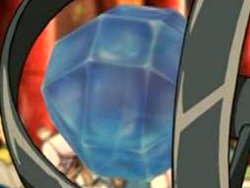 |
|
|
|
Artificial
Derivatives
|
|
|
Sun Stone
It is thought to be the result of Pyrocite
having been crafted by jewellers of ancient times. The techniques used by the
jewellers to sculpt the Pyrocite into this unique shape, in turn altered the
structure of the mineral itself. Sun Stones emit a faint light and have been
known to evolve certain species of
Pokémon. |
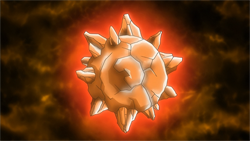 |
|
Leaf Stone
Created when Taragirite is exposed to the Aura from a certain
species of plantlife. In
the time before conventional medicine and Pokemon healing machines,
Agrarian
Seers and herbalists would make Leaf Stone shards as a means to re-energize
Pokémon.
However, like healing machines, Leaf Stones are incapable of repairing major
injury. It has since been discovered that Leaf Stones can evolve certain species
of
Pokémon. |
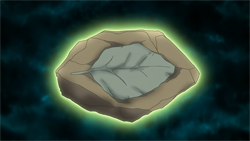 |
|
Edilite
A synthetic variant of Ignicite. Primarily,
Edilite is used as a Pokéball component, and is responsible for altering a
Pokémon's
body into a digital format for storage. |
|
|
|
|